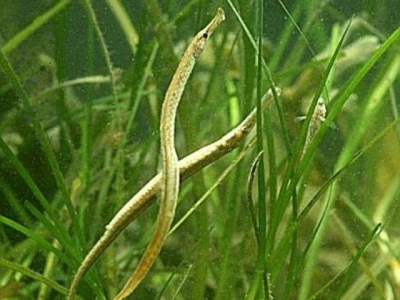A cold cure for sick fish

When pipefish are sick, they swim towards cooler water to get better. But what will happen when global warming causes the world's seas to heat up?
Pipefish belong to the same family (Syngnathinae) as seahorses. A special trait is that the males take on fertilised eggs and give birth to offspring. Even “pregnant” males in this study dropped the advantages of warm water when they were exposed to disease. (Photo: Ola Jennersten)
The pipefish is a peculiar creature that looks like its relative, the seahorse, but one that has been stretched and straightened.
This distinctive fish has captured the interest of Gunilla Rosenqvist, a professor at the Norwegian University of Science and Technology (NTNU) in the university’s Centre for Conservation Biology: For the past several years, Rosenqvist has specialised in pipefish.
She and her colleagues are interested in the kinds of behavioural trade-offs that animals may make given different environmental pressures. The pipefish, as it turns out, offers an intriguing way to study this question, by allowing researchers to study how the fish behave when they are sick.
Warm can be good
For the most part, warm water is a good place for a pipefish. The male pipefish, like its cousin the seahorse, gives birth to live offspring. Warm water can shorten the length of a male pipefish's “pregnancy”, a distinct advantage for the males. Another advantage of warmer water is that it can prolong the pipefish's reproduction season.
But warmer water is also a boon to parasites, and therein lies the pipefish's dilemma.
In warm, more hospitable waters, parasites may produce more eggs and more offspring, which makes it easier for them to take over their host’s body.
If the parasites win, it’s curtains for the pipefish.
So what's a pipefish to do? The researchers decided to find out whether the fish changed its water temperature preferences when parasites were present.
Into the cold
The researchers collected broad-nosed pipefish from the central Baltic Sea off of the east coast of Gotland, Sweden, and infected them in the laboratory with a bacteria called vibrio.
Vibrio is found in the fish’s natural habitat and affects them much like a parasitic infection. If ocean temperatures warm, this will mean greater numbers of bacteria in the water, which in turn can represent an increased threat of infection for the fish.
Once they had infected their captive pipefish with the bacteria, the researchers gave the fish access to aquaria that had areas of warmer and colder water.
“We saw that the fish that were infected chose to swim toward the cold side,” says Rosenqvist.
Even though there were drawbacks to swimming into colder water - longer pregnancy for the males, for example - the fish clearly chose the cold water to cut the proliferation of parasites - or in this case, bacteria.
The warming of the seas could thus make it harder for fish to protect themselves against parasites, a predicament which might make stocks of fish leave their traditional habitats and swim towards cooler areas.
Fish on the run
“If seawater gets warmer fish might look for cooler water elsewhere. Fish stocks will migrate and maybe disappear from certain areas,” Rosenqvist says. “Warmer waters can also have the dire consequence of stressing fish, making them sick and gradually eradicating populations.”
The difference in temperatures between the two tanks from which the fish could choose in the experiment was five degrees Celsius.
Parasites and bacteria are found in all environments. Some are useful, while others are detrimental. The researcher thinks her experiments could be germane to other species, not just pipefish.
Translated by Glenn Ostling
Có thể bạn quan tâm
 A better way to do aquaponics
A better way to do aquaponics The traditional aquaponics single-unit system disadvantages the fish, the plants or both. Now might be the right time to rethink the design.
 Probiotics may offer Atlantic salmon, trout protection against cold-water disease
Probiotics may offer Atlantic salmon, trout protection against cold-water disease A probiotic treatment may help protect salmonid species from cold-water disease. Probiotic protection also may offer a way to reduce the use of antibiotics
 Encapsulated yeast strain could boost immune response in fish
Encapsulated yeast strain could boost immune response in fish Fish fed the encapsulated diet had the largest weight gain and growth rate, said the researchers. That group also had the lowest feed conversion ratio.